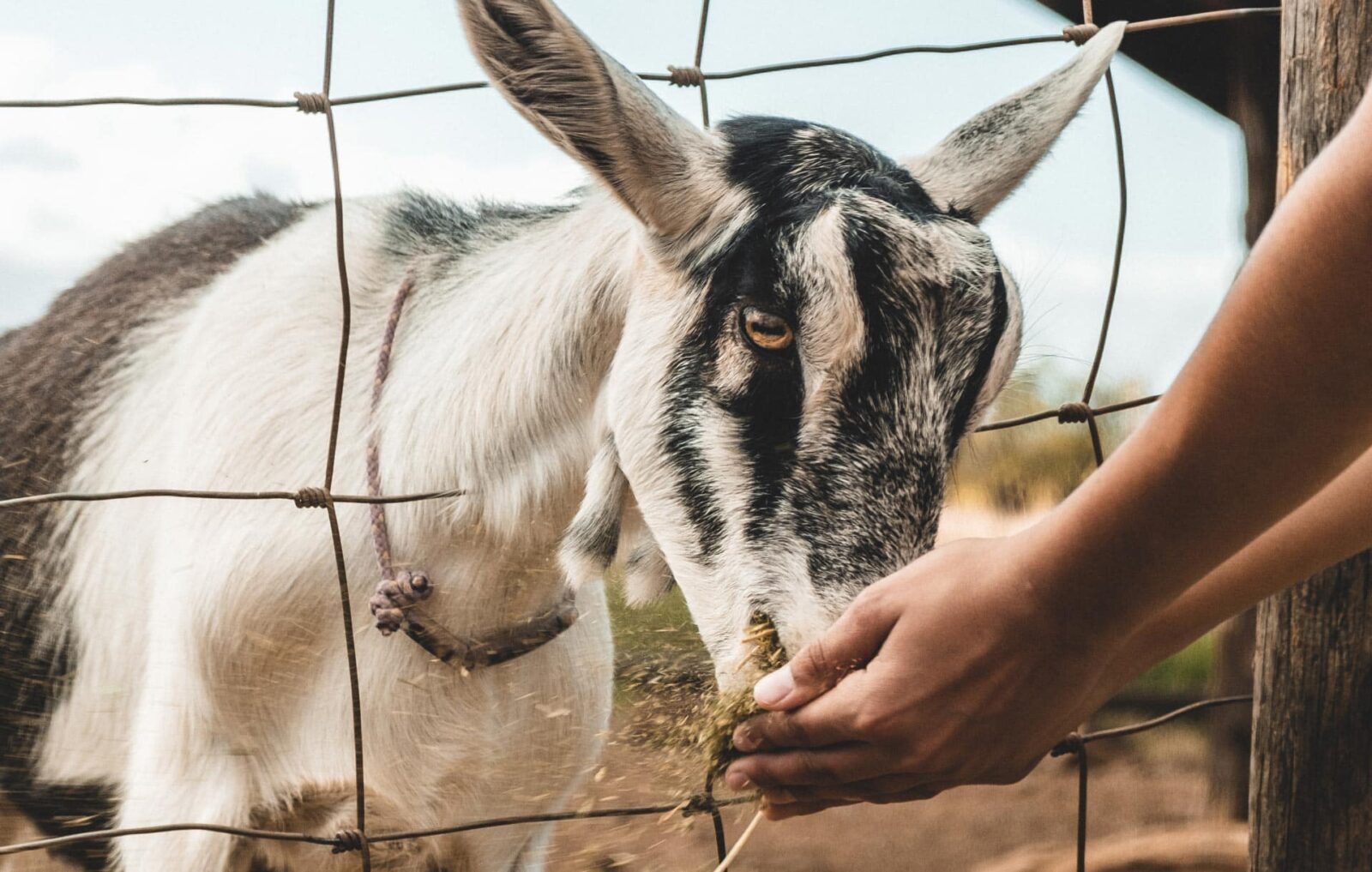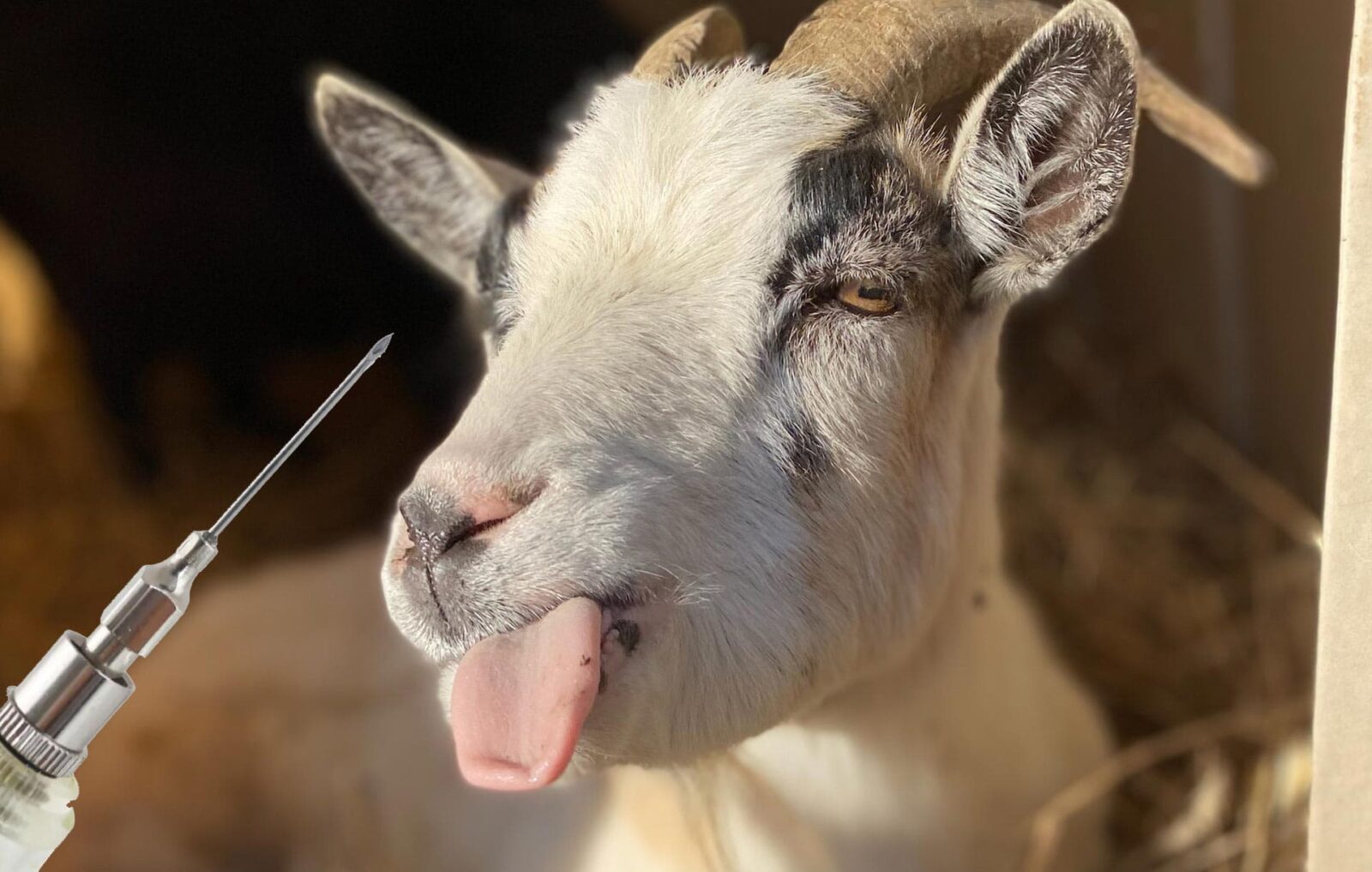There is always a concern about the population of worm parasites in ruminant animals, hence the need for goat dewormers, if you want your goats to keep up with their excellent productivity. Worm parasites are digestive and nutritional enemies that cause inadequate conversion of feed to meat and reduced milk production. They also cause some diseases in goats.
Goat dewormers are medications meant to reduce the population or eliminate the worms present in the different parts of a goat’s digestive gut. They are usually available as oral, injection, or pre-mix medications for goats and should be used at regular intervals, preferably after noticing a spike in worms and their eggs’ population in your herd’s feces.
After reading this piece, you will understand the importance of dewormers in keeping goats and helping them remain productive. You will also understand how dewormers work and the types of dewormers that exist for goats. Ultimately, some dewormer options you can choose from will be provided, buy anyone that suits your need.
What Does a Goat Dewormer Do Exactly?
A goat dewormer is a medication that has been tested and proven to be effective in reducing the egg population of internal parasites (worms) in goats. Dewormers are used to address worm infestation in the gut and digestive tract of goats to reduce their health implication on the goats, and economic effect on the farm.
A goat dewormer works by exerting its effect on the eggs of the worms present in the digestive tracts of affected goats. They prevent these eggs, which can be found in the feces of goats when expelled, from hatching and increasing the population of internal parasites a goat has to deal with. They also kill the adult worms and sometimes expel them with your goats’ feces.
Usually, the adult parasitic worms can live for between one year and thirty years, depending on the type of worm, if they are untreated and all conditions are favorable. They will reproduce by laying eggs in the intestine and increase in population. Goat dewormers, when used, will help to kill the adult worms by cutting them into pieces, and facilitate the expulsion of the eggs from the intestine.
These eggs are not usually killed and can be re-ingested by your goats if appropriate waste management is not practiced. Therefore, accurate timing is needed to get the best result when deworming your goats. You need to target the period when the eggs have been laid and not before, depending on the type of dewormer you choose to use.
Usually, it is recommended that you have a schedule for deworming your goats, even though not all goats in the herd should be dewormed, if they do not all have parasitic worm eggs in their feces. The fecal egg count is what signifies how much worm infestation your goats are experiencing. Therefore, you need the fecal egg count and test to determine the type of parasite to treat the affected goats against.
Types of Dewormers
All dewormers are used for the same purpose. However, there are different types of dewormers, based on different categorizations. Some of them include:
Target Worms
This type of goat dewormer either expels specific types of worm parasites or has a debilitating effect on the reproduction of the different types of worms present in the goats’ intestines. They include:
Broad Spectrum Dewormers
These are the types of target worm dewormers that can be used for any type of worm. They are capable of killing any type of worm in the intestine of your goats and help to expel the eggs they have laid. They are mostly used in small farms where the need for fecal egg count and testing is not a norm.
Specific Worm Dewormers
These are the types of dewormers recommended by veterinary doctors to address the infestation of specific worms. For instance, a vet, after examining each goat in your herd’s feces, may recommend a dewormer that addresses hookworms alone, mainly because it is the prevalent worm affecting your herd.
Administration
Types of dewormers based on administration refer to the route or means through which your goats get the required dosage of dewormer into their body. Mostly, goats get their dewormers through the mouth and skin.
Oral
Oral dewormers are the types of dewormers that are given to goats through the mouth. They are mostly liquid and are usually passed into the base of the tongue, for better results, while using a drench gun. Oral dewormers go directly to the rumen and help to reduce drug wastage as goats can spit out most of the medicine if they are applied to the fore of the tongue.
Also, oral dewormers are present as feed pre-mixes. They are usually powdery or available as mineral blocks. The powdery oral dewormers are usually mixed with grains for the goats to ingest while the block mineral licks are hung for the goats to reach and lick.
Injections
Injections are supplied to the body of your goats through their subcutaneous. The injections are contained and supplied to the goats through a syringe that is inserted under the skin and into their veins.
This type of dewormer is not common in dairy goat farming as it can be tedious. The injection has to be delivered into the subcutaneous layer of the skin. This can be difficult especially because of the hair on the goats. Also, if you are to ensure that the injection delivers right, it will take some time as you may need to apply the medication on the front legs of the goats.
Active Ingredients
Dewormers are also classified according to the active ingredients they contain. While the active ingredients have a narrower classification, some of them are legalized for use in goat deworming, while others, although not banned, can be used as extra-label. In other words, the extra-label dewormers contain active ingredients that are not approved by the FDA while the others are FDA-approved.
Benzimidazoles
The goat dewormers under the Benzidamole class are effective against nematodes, trematodes, cestodes, and to an extent, liver fluke. In other words, it functions as a broad-spectrum goat dewormer and has a wide safety margin. However, its use in treating worm infestation in ruminants has been reduced due to the availability of more effective options.
In this group of goat dewormers, the FDA-approved ones include fenbendazole and albendazole, available under different brand names but with the same active ingredients.
Imidazothiazoles
This group of dewormers include levamisole, present in the market as Tramisol and Levisol, and morantel tartrate (you’ll find it under the brand name, Rumatel). They are broad-spectrum nematicides that are effective against worm parasites and commonly used in ruminants, including goats.
They work by causing a breakdown in the functioning of the nervous system of parasitic worms and they are easy to use as they are soluble in water. They are administered as oral goat dewormers, injection, or pour-on in other ruminants. They effectively kill nematodes and lungworms of all ages.
It is important to note that only morantel tartrate is FDA-approved in this group for deworming goats.
Macrolides
Macrolides, also called macrocyclic lactones, are effective antiparasitic medications against nematodes, whether mature or young. They exert their effect even at low doses and their effect can last till the next nematode infestation. They are administered through every available means of drug administration in animals. However, they are mostly present in the adipose tissue after administration, hence they are commonly administered through injection, especially in goats.
Goat dewormers under this category are not approved by FDA to be used on goats. However, they have been known to be effective in endo and ectoparasite control in ruminants, including goats. They include ivermectin and moxidectin.
Recommended Goat Dewormers
These are the goat dewormers we recommend you use for your goats. They include FDA-approved goat deworming options and extra-label goat dewormers. Considering the pros and cons we will highlight and the dosages that will handle your herd, you can choose any of the below-listed.
Valbazen Cattle Broad Spectrum Dewormer Liquid (albendazole)
Valbazen Cattle Broad Spectrum Dewormer liquid is an oral goat dewormer option that helps to expel adult worm parasites, such as liver flukes, lungworms, intestinal worms, among others, from your goats, among other cattle.
Its active ingredient is Albendazole, which is approved by FDA for use in deworming goats. It is available in a 500 ml bottle, making it available for use over a long time.
Pros
- It is an FDA-approved goat dewormer
- It comes in a large capacity container
- It is a broad-spectrum goat dewormer
- It can be used for other cattle.
Cons
- It requires a withdrawal period of, at least, 7 days.
- It cannot be used for pregnant goats in their first trimester
Merck Safe-Guard Dewormer Suspension
As a goat dewormer, it is one of the go-to dewormers for goat farmers. Merck Safe Guard Dewormer Suspension belongs to the Benzimidazole group and can be used against different types of parasitic worms.
It can easily be mixed with your goats’ water as it is in suspension, reducing labor and saving time. It is also available in 33.8 Fl Oz of up to 4 packs.
Pros
- It is a broad spectrum goat dewormer
- It is easy to use
Cons
- Worms easily develop resistance to it.
Ivomec Sheep Drench (Ivermectin)
Ivomec Sheep Drench is a dewormer that can also be used for goats. Although Ivermectin is commonly available in injection formulation, Ivomec provides it in oral formulation for easier application and use. It comes in a 240 ml bottle, meaning more volume for more goats.
This wormer can be administered to goats using a drench gun and will effectively kill external and internal parasites.
Pros
- It is a broad-spectrum dewormer
- Comes in a bigger bottle for worming more goats
- It is easy to use
Cons
- It is not FDA-approved.
Prohibit Soluble Drench Powder (levamisole)
Prohibit soluble drench powder is an easy way to deworm your goats by dissolving the powder in water and orally giving it to your goats. It is effective against a wide range of worms, including intestinal worms that make your goats appear starved.
Pros
- It is easy to use
- It is easy to transport and store
- You can deworm more goats with one sachet
Cons
- It is not FDA-approved.
Cydectin Sheep Drench (moxidectin)
Cydectin Sheep Drench is a liquid dewormer that is suitable for cattle but not approved for use in goats. It is usually not used for cattle that are below 4 months old and is administered orally. It requires the use of a drench gun to supply the solution to the base of the goats’ tongues.
It is not approved for use in cattle that produce milk for human consumption. Also, do not use for cattle that is due for slaughter in seven days or less.
Pros
- It is easy to administer
- It comes in one-liter containers
- It kills adult and larval worms in the intestines.
Cons
- It is not FDA-approved for goats
- It cannot be used for goats less than 4 months old
Rumatel (morantel) Feed Pre-mix
The VitalEdge Rumatel Goat Dewormer Concentrate is specifically made to cater to the deworming need of goats. It is suitable for goats of all ages and classes and will effectively disrupt the lifecycle of gastrointestinal worms in your goats.
It is safe to use in pregnant and lactating goats and only needs to be mixed with your goats’ feed.
Pros
- It is easy to store and use
- It can be used for goats of all ages and class
- It is safe for use in pregnant and lactating goats
Cons
- It does not contain withdrawal period information
Dewormer Tools
Dewormer tools are simple equipment that aid in the administration of worming medications to cattle. They are an important tool in raising goats if you are particular about the good production of meat and milk. For oral administration of goat wormers, the common dewormer tool is a drench gun. It is used to introduce the solution to the inner part of the mouth, the base of the tongue, specifically, to avoid wastage.
However, a syringe and needle are used to administer dewormers to cattle if the administration method is injection.
Duratek Drenching Syringe
This dewormer tool is made to deliver orally administered wormer to the base of the goats’ tongues. It comprises the feeding nozzle, usually made of stainless steel for durability and easy sterilization, a clear syringe that has markings of calibration, to ensure accurate dosage supply, and the dose nut, that pushes the wormer contained in the syringe into the feeding nozzle.
Pros
- It makes oral wormer administration easy
- It is easy to clean
- It does not require expertise to use
Cons
- It may be uncomfortable to use initially.
Is it safe to combine dewormers?
Since many nematodes have become resistant to single active ingredient medications for deworming goats, many farmers have resorted to combining different goat dewormers with different active ingredients for better results. However, goat dewormers in the same pharmaceutical group usually have the same mode of action and after some time, the worms become resistant as well.
In some countries, like Australia, the use of combination dewormers has been in practice for a while. It is not uncommon to see three different active ingredients from different dewormer groups in one container in veterinary stores. This practice has come to America, with farmers manually mixing dewormers, and has seen some success. The question with it is its safety.
The FDA has not approved any combination of goat dewormers in America. It is, therefore, safe to assume it is unsafe, even if it is not considered so in countries where they are legally allowed. However, if single active ingredient dewormers do not seem effective on the worms affecting your goats, consult a veterinary doctor.
Deworming pregnant goats
Pregnant goats require special care and attention. While deworming goats is not difficult to accomplish, extra care has to be taken in dealing with pregnant goats, to avoid the loss of their kid. You should determine if the active ingredient in the dewormer you have chosen is safe for use for pregnant goats. You can easily get this information from your local veterinary doctor.
Some safe goat dewormers for pregnant goats include Valbazen suspension (not to be used in the first trimester of pregnancy), Safeguard, and Panacur. However, do not use Albendazole for pregnant goats, and consult your veterinarian before you use any medication for your pregnant goats.
How we deworm our goats
Different farms deworm their goat differently. While some prefer to use oral administration, we prefer to use injection, mainly because we prefer to use ivermectin, for its broad spectrum and action against endo and ectoparasites. Here’s a step-by-step guide on how we do it.
- We start with the fecal egg count, FEC. We insert disposable gloved fingers into each goat’s anus and retrieve some fecal pellets.
- Each disposable glove is inverted, holding the fecal pellets, and they are numbered according to the tag of the goats.
- The fecal pellets are taken to a lab for a test to determine the type and population of intestinal parasites in each goat.
- Depending on the result of the test, we gather the goats that need deworming in one pen.
- With sterilized 18 gauge needles, syringes, and the required bottles of ivermectin, we let the goats out of the pen one by one.
- Each goat gets a shot below the skin just behind their shoulder. 1 cc injection for every 75 lbs body weight.
- We rub the shot point to prevent bleeding and back-run of the injection.
Deworming Schedule
How often you deworm your goats depend on the deworming strategy you adopt. You may choose to be strategic in your approach to targeting intestinal worms. With this strategy, you begin deworming your goats, especially the does when they are about a month from parturition, and continue every 3 to 4 weeks.
You may also be aggressive by targeting only the small population of goats that have the highest worm infestation in the herd. Another strategy is to test the egg count in your goats’ feces and treat the goats with the highest range of parasitic eggs.
Whichever strategy you use has to follow a corresponding and matching schedule. For instance, that strategic deworming strategy follows a deworming repetition every 3 to 4 weeks. The tactical deworming strategy involves collecting fecal samples and testing every two weeks; meaning you should deworm when the population of parasitic eggs is higher than you deem okay. The aggressive goat deworming approach is done in two weeks intervals.
However, generally, you can deworm your goats every 2 to 3 months.
Frequently Asked Questions about Goat Dewormers
What Dewormer is Safe for Goats?
The safety of dewormers for goats depends on the adherence to dosage and administration, as advised by professionals. Goats can be wormed using the different worming medications approved by the FDA. Their dosage and administration are usually written on their bottles. However, if you seem confused, consult your local veterinary doctor.
Dewormers such as Ivermectin, Prohibit, Safeguard, and Valbazen, are generally safe for use in goats.
How Often Should Goats be wormed?
To avoid resistance building to the active ingredients in dewormers, it is advisable to leave a considerable length of time between worming exercises. Generally, you can worm your goats at an interval of two to three months.
However, if the infestation is high, you can worm them every month. Some farms worm their goats every three weeks. Any length of time less than three weeks may provide undesirable results, except dewormers that are capable of killing eggs are used for the herd.
What are the Symptoms of Worms in Goats?
Worm infestation in goats comes with numerous signs and they can range from tiredness to loss of appetite. Although these symptoms can be attributed to other causes, more specific symptoms include weight loss despite feeding well, Anemia, diarrhea, and abnormally rough coat. You can also look out for how pink the inner lining of the eyes is. The pinkier they are, the healthier your goats are.
Conclusion
Worms are dangerous to the health of goats and can significantly affect the productivity of your herd, hence the need to expel them from the intestines of your goats using dewormers. Goat dewormers available for use depend on your choice. Although some are not approved by FDA, you can use them for your goats, with the guidance of a veterinary doctor.
















Leave a Reply